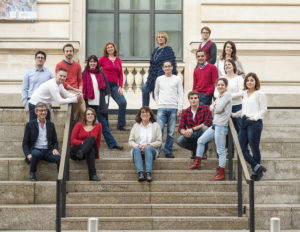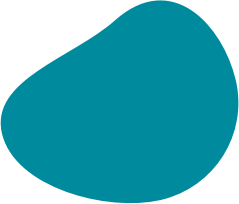
The project is coordinated by the pneumology department of the Nantes University Hospital.
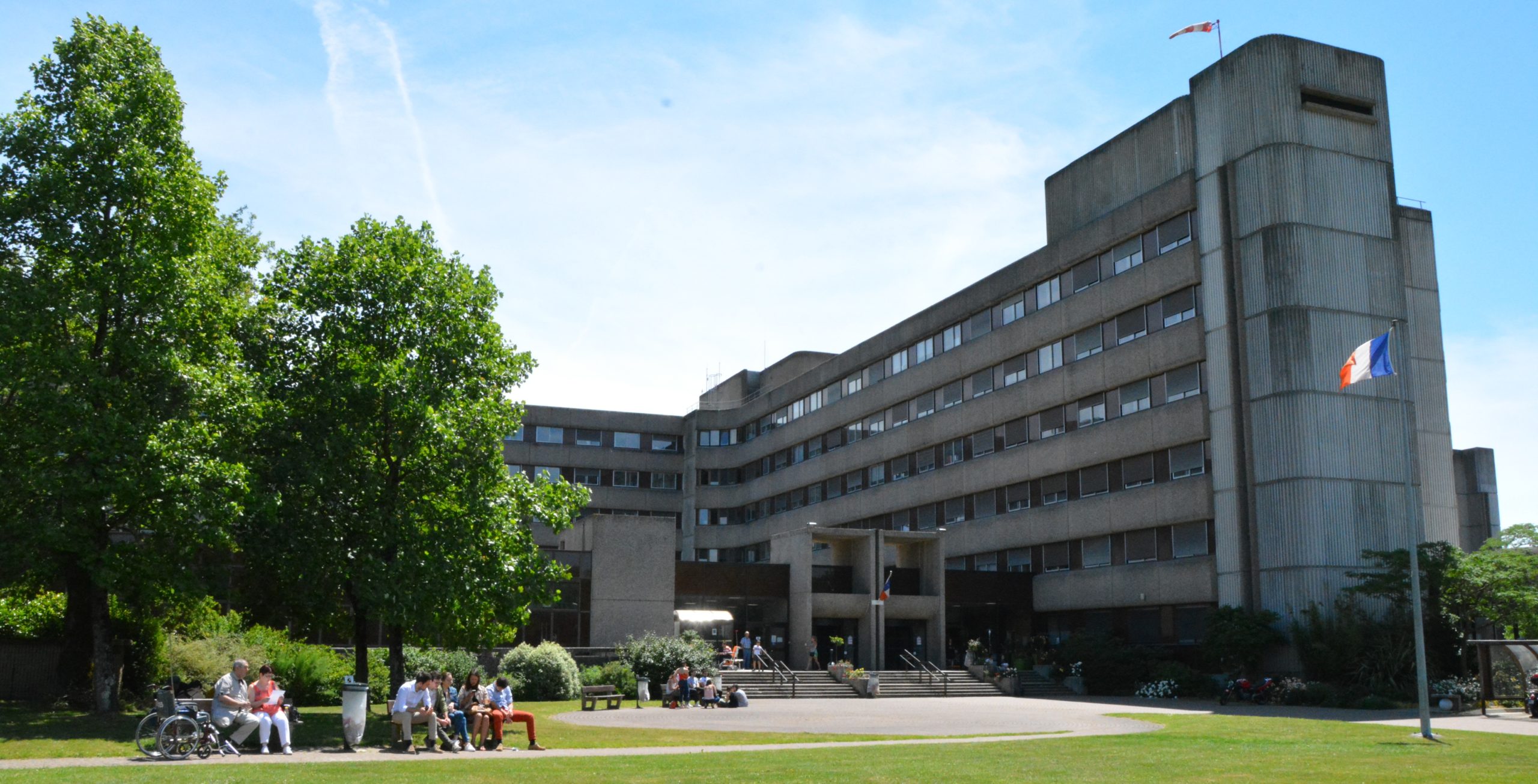
Located at the Nord Laennec Hospital in the commune of Saint-Herblain, the pneumology department of the Nantes University Hospital, directed since 2015 by Professor François-Xavier Blanc, is an integral part of the Thorax Institute, a care, teaching and research structure grouping together the departments of cardiology, thoracic surgery, vascular surgery, hemodynamics, endocrinology and pneumology. Translated with www.DeepL.com/Translator (free version)
The Respirology Department has 66 beds in 4 conventional medical care units (pulmonary diseases; thoracic oncology; cystic fibrosis, pulmonary hypertension and transplantation); respiratory intensive care), a day hospital shared with the other specialties of the Thorax Institute, a day hospital dedicated to thoracic oncology, 4 weekday hospital beds for short check-ups, 4 shared sleep recording beds, an endoscopy unit with daily access to interventional bronchoscopy, a smoking cessation unit and a clinical research unit within the « Centre d’Investigations Cliniques – CIC Thorax ». A transversal allergology platform located on the Hôtel Dieu site is also attached to the service.
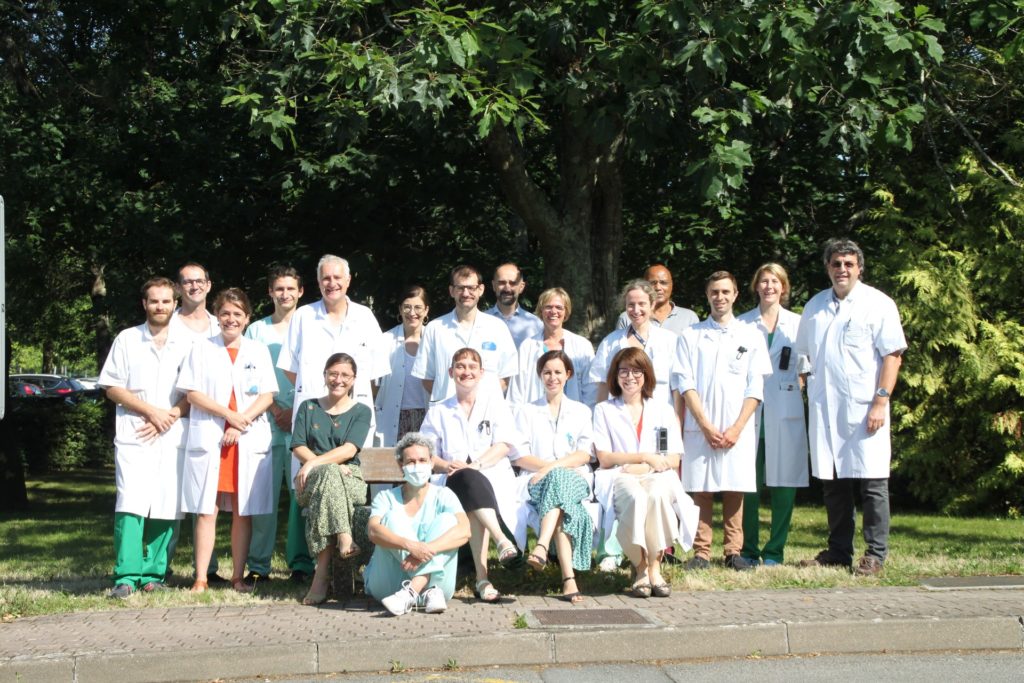 The service includes 21 permanent senior physicians, 4 of whom are qualified to conduct research and 5 of whom have a PhD. Four new Residents in Pneumology and two in Medical Oncology are trained each year. Most of them obtain a master’s degree at the end of their training (5 years). The service covers all areas of respiratory medicine with a particular focus on lung cancer (from diagnosis to treatment), cystic fibrosis (cystic fibrosis resource and competence center, Nantes-Roscoff Constituent Center), pulmonary arterial hypertension (competence center), asthma, infectious diseases and lung transplantation. It is a pioneer center in the management of severe asthma for the West of France and one of the 6 lung transplant centers outside the Paris region.
The service includes 21 permanent senior physicians, 4 of whom are qualified to conduct research and 5 of whom have a PhD. Four new Residents in Pneumology and two in Medical Oncology are trained each year. Most of them obtain a master’s degree at the end of their training (5 years). The service covers all areas of respiratory medicine with a particular focus on lung cancer (from diagnosis to treatment), cystic fibrosis (cystic fibrosis resource and competence center, Nantes-Roscoff Constituent Center), pulmonary arterial hypertension (competence center), asthma, infectious diseases and lung transplantation. It is a pioneer center in the management of severe asthma for the West of France and one of the 6 lung transplant centers outside the Paris region.
The thoracic oncology unit coordinated by Pr Jaafar Bennouna participates in the interdisciplinary care for lung cancer and mesothelioma set up at Nantes University Hospital in coordination with other departments: radiology and interventional radiology teams, anatomopathology, molecular biology, thoracic surgery, palliative and supportive care. The patient’s journey is clearly defined, with the nurse coordinators taking care of the patient as a whole. In 2018, 254 lung cancer patients (+11.9% compared to 2017) were treated, corresponding to 2,236 cycles of chemotherapy or immunotherapy (+27.9% compared to 2017). In addition, between June 2017 and June 2018, 54 patients were enrolled in clinical trials, including Phase I trials. Since 2017, eleven clinical trials have been opened in the unit. Patients treated in the ambulatory care unit with chemotherapy, immunotherapy or targeted therapies can be monitored for their symptoms via a smartphone or tablet computer. The Thoracic Oncology Unit works in close collaboration with the Molecular Anatomopathology Department to monitor the treatment of patients with cDNA.
The Respirology team at CIC Thorax is composed of dedicated project leaders, technicians and clinical research nurses who support Phase I-IV clinical trials in respiratory diseases.
The LUNG O2 cluster groups around the pneumology department, including thoracic oncology :
Team III « Signaling in vascular and pulmonary pathophysiology » led by Gervaise Loirand of the Thorax Institute (UMR 1087),
The « Vascular and pulmonary signalling and pathophysiology » team at the Institute of Thorax (UMR Inserm 1087/Cnrs 6291) is interested in understanding the cellular and molecular mechanisms involved in the development and progression of allergic asthma and pulmonary arterial hypertension. The projects developed aim to identify the events and actors responsible for alterations in the structure and function of the cells of the bronchial wall in asthma and of the pulmonary arteries in pulmonary arterial hypertension. The approaches and strategies put in place are designed to bring together fundamental and translational aspects, as illustrated by the NaRacAS project. The realization of our projects should lead to the generation of relevant experimental models for the study of these pathologies, to the discovery of targets of interest for the development of new therapeutic strategies.
Team IV « Immunoregulation And Immunointervention in Transplantation and Autoimmunity » led by Sophie Brouard of the Transplantation and Immunology Research Center (UMR 1064)
Team IV« Immunoregulation and Immunointervention in Transplantation and Autoimmunity » of the Centre de Recherche en Transplantation et Immunologie (CRTI-UMR 1064) co-directed by Dr. Sophie BROUARD and Pr. David LAPLAUD, brings together scientists and clinicians to address questions in kidney, liver and lung transplantation and the pathophysiology of autoimmune diseases, in particular multiple sclerosis and autoimmune hepatitis, with a fundamental and translational approach. Through the development of bio-collections (DIVAT-Biocoll, CENTAURE, COLT) and databases (DIVAT), the team focuses on immune and lymphocyte regulation mechanisms in these different pathological contexts and the search for companion, diagnostic and prognostic biomarkers. The IV team around Sophie BROUARD is thus co-leader of a major RHU project aimed at improving and drastically modifying the management of transplant patients.
Finally, the aim of this research is to develop innovative therapeutic strategies in these different fields of application. This allows this team to have significant experience in industrial development through the filing of several patents, some of which are currently under license, and has also contributed to the foundation of several startups and spin-offs (TcLand, Xenothera, Effimune and Osé-immunotherapeutics).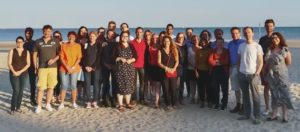
Team V » Translational ImmunoGenetic in AutoImmunity and Transplantation » directed by Pr Pierre-Antoine Gourraud of the Transplantation and Immunology Research Center (UMR 1064)
The CRTI Team V « Translational immunogenetics in autoimmunity and transplantation » led by Pr Pierre Antoine Gourraud: The ATIP/Avenir team was created in September 2015. His research interests focus on immunogenomics and precision medicine approaches for complex immune traits and diseases, including multiple sclerosis, infectious diseases and transplantation. By bringing together scientists from various fields of expertise (biology, bioinformatics, statistics, immunogenomics, epidemiology), our team’s main objective is to tackle diseases and complex traits related to the immune system by integrating multiple large datasets (genomics, biological and clinical) in precision medicine applications. Our research projects are divided into two main areas: (1) Immunogenomics and Epidemiology and (2) Applications of Precision Medicine.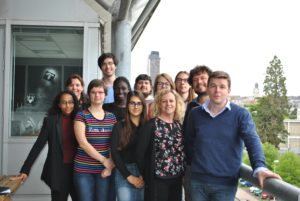
CRCINA INSERM UMR 1232 – Team 4: Immunogenic cell death and mesothelioma therapy.
Malignant pleural mesothelioma (MPM), a cancer related to asbestos exposure, and non-small cell lung cancer (NSCLC) are two types of aggressive thoracic cancers for which conventional treatments lack efficacy. Although the recent advent of immunotherapy has improved the clinical prognosis of many patients, many patients unfortunately do not benefit from these new strategies.
On the basis of a collection of patient samples (tumor explants, pleural fluids, blood and cell lines), our team develops research projects that aim to better characterize tumor cells and the microenvironment of these cancers in order to propose appropriate therapeutic strategies. In particular, we are studying the expression of markers in patient samples as well as cells constituting the tumor microenvironment, including tumor-associated macrophages (TAMs), which have immunosuppressive properties.
In parallel, the therapeutic approaches that we are developing aim to modify this microenvironment in order to promote the establishment of anti-tumor immune responses. We are evaluating the use of combinations of epigenetic agents, as well as oncolytic viruses (OV), whose past work has shown their ability to induce immunogenic death of tumor cells.
Our short and medium term projects are I) to continue the study of the tumor microenvironment on the basis of our collection and the development of 3-dimensional co-culture models, II) to improve epigenetic therapeutic approaches through the study of new combinations but also through the development of new vectorization tools, III) to develop and optimize OV for the treatment of thoracic cancers.
All this work should make it possible to propose innovative and adapted therapeutic strategies to modulate the tumor microenvironment and improve the treatment of thoracic cancers.
Our integration within the LUNG O2 network facilitates discussions and exchanges of materials between researchers and clinicians, thus optimizing the orientation of research projects for clinical transfer.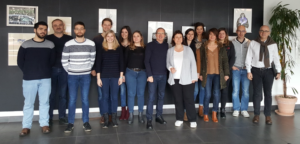
Laboratory EA3826: « Impact of acute inflammation on host-pathogen interactions and pulmonary homeostasis » directed by Pr Antoine Roquilly
We have shown that acute inflammation leaves an immunological scar in the lungs, mainly characterized by functional alterations of mononuclear phagocytes. The main goal of Our team is dissecting the mechanisms of this so-called « trained » immunity, and its consequences on pulmonary homeostasis and susceptibility to diseases such as bacterial and viral pneumonia, using large biocollections from hospitalized patients and matched healthy controls. We follow a cyclical strategy to align animal and human studies using state-of-the-art functional genomics and validation studies. We are developing translational projects in three complementary axes based on the study of the interaction between the pulmonary microbiota and mucosal immunity during and after inflammation.
Axis 1: Host-pathogen interactions in the lungs.
Axis 2: The inflammatory state and its role in human physiopathology.
Axis 3: Development of immunotherapies and precision medicine approaches.
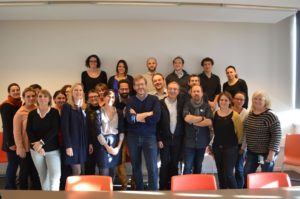
The molecular genetics platform for cancer at the Nantes University Hospital and the ICO, directed by Prof. Marc Denis.
The Regional Tumor Molecular Biology Platform was funded by the National Cancer Institute (INCa) in 2008. Since then, we have developed numerous approaches to perform molecular tests on lung and colorectal tumors as well as melanomas. In particular, we have developed Next Generation Sequencing or NGS approaches to perform a detailed analysis of lung tumors. Current efforts are mainly focused on tumor characterization at the RNA level (RNA sequencing), and detection/characterization of molecular alterations in circulating DNA (deep sequencing and digital PCR). This organization has allowed us to create a network at the regional level, and to develop translational research projects both at the regional (ELUCID) and national (MELROSE) levels, which are part of the LUNG O2 cluster.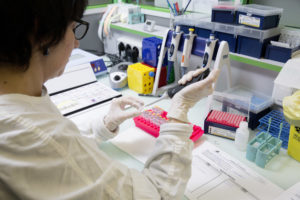
The MIHAR laboratory: Microbiotes, Hosts, Antibiotics and Bacterial Resistance, with Dr Emmanuel Montassier,
MiHAR‘s research focuses on antimicrobial resistance. According to the World Health Organization, antimicrobial resistance is one of the most important health threats for the coming decades. Currently, antimicrobial resistance is responsible for 700,000 deaths per year; in the absence of policies to counteract this burden, it is projected that by 2050, antimicrobial resistance will become a devastating problem with 10 million deaths each year. This figure is higher than the number of cancer deaths in 2018.
Many factors influence the emergence and spread of bacterial resistance. Among the latter, the exposure of bacteria, particularly bacteria of the intestinal microbiota, to antibacterial agents (antibiotics) promotes the emergence of bacteria resistant to these antibiotics, but also to other antibiotics. In our laboratory, we study how interactions between organ microbiotes, host and antibiotics can influence the emergence and spread of resistant bacteria. We are also studying how the microbiome can predict the emergence of antimicrobial resistance using « omics » technologies, including metagenomics, transcriptomics, proteomics and metabolomics.
As part of the LUNG O2 cluster, the MiHAR team will work on the discovery of biomarkers of the microbiota in nosocomial pneumonia, the leading cause of death from nosocomial infections in critically ill patients. Our goal is to use our expertise in bioinformatics to find signatures and biomarkers to predict the occurrence of nosocomial pneumonia in critical care hospitalized patients. For example, our computational microbiology team is developing methods and software that will contribute to precision medicine in the service of research on respiratory diseases.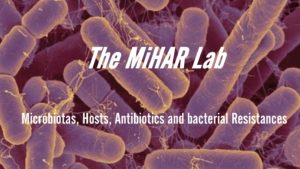
The Laboratoire des Sciences du Numérique de Nantes (LS2N) with Emilie Poirson,
The health of the future is one of the 3 major economic and societal challenges addressed by the Ecole Centrale de Nantes both in research and training. These 2 activities are represented within the LUNG O2 cluster by Emilie Poirson and Thomas Lechevallier, who are continuing an already very active collaboration with the CHU in the field of connected healthcare.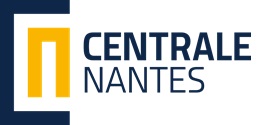
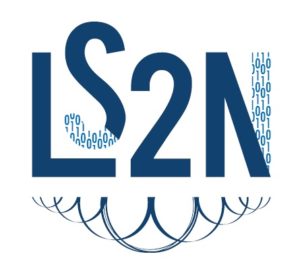
Emilie Poirson
University professor, member of the Nantes science and digital laboratory (LS2N), within the PACCE team (Perception, Action Cognition for Design and Ergonomics). She works particularly on the place of the human being in product design (perceptions, emotions, interfaces…), especially on applications in the field of health (connected home for health).
Thomas Lechevallier
With extensive experience in engineering in the field of health, particularly at the Nantes University Hospital, he is in charge of a course in Health Engineering. He is also holder of the Environment, Mobility, Health option of the Ecole Centrale de Nantes which is part of the LUNG O2 cluster.
The Data Clinic (Pr Pierre-Antoine Gourraud), of the Nantes University Hospital (CHU)
The Nantes CHU biomedical data warehouse (EDBN) combines both structured (coded) and unstructured (report text) data. It includes 17 million stays concerning 2.4 million patients admitted to Nantes University Hospital, the majority since 2000, including 128 million structured data and more than 27 million documents, such as reports. An update is carried out on a weekly basis. Data are collected from several sources: PMSI (Programme de Médicalisation des Systèmes d’Information): diagnostic and procedural codes, plain text reports (consultation, hospitalization, imaging, genetics, biology, surgery, laboratory results) and structured laboratory results (numerically coded variables).
Methodologically, the project will benefit from the expertise of the CHU’s Clinical Data Service (CHU, INSERM, CIC 1413, Clinique des données, Nantes, France). The Data Clinic legally and scientifically facilitates access to health data from institutional sources, including the university hospital center, and encourages the deployment of appropriate epidemiological and computational methods to provide the highest level of interpretation of complex data.
The Data Clinic provides support to hospital researchers in the Nantes CHU community by assisting clinical research in data extraction and computer analysis.
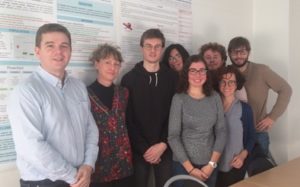
The Department of Training Institutes (DIF) of the Nantes University Hospital Center (CHU)
The Department of Training Institutes (DIF) of the Nantes University Hospital Center (CHU) is attached to the Human Resources Department.
The DIF includes 11 schools or institutes that prepare for diplomas ranging from level 3 to level 7 in the field of health and social work. Their mission is to provide initial and continuing education for health professionals in order to meet the health needs of the population. The DIF is developing a genuine regional policy adapted to the needs of the healthcare territory’s labor market and, more specifically, to those of hospital and non-hospital institutions.
Approximately 1,200 students benefit from these training courses.
Dynamic pedagogical teams, associating specialized professionals from health establishments, the social sector and the university, accompany students and pupils throughout their training.
During his or her studies, the student or pupil benefits from qualified internships in the care units of the Nantes University Hospital but also in other establishments and structures in the Pays de Loire region as well as nationally and internationally.
Thanks to its experience, its values, its human resources competent in the structuring of training devices, positioned in an attractive city and a dynamic region, the DIF of Nantes University Hospital offers a study framework perfectly adapted to the realization of professional projects in the sanitary and social field.
The human and social sciences (SHS), which are very important in paramedical training, form a set of disciplines that study various aspects of human reality on both an individual and collective level. The purpose of these disciplines is to analyze human activity (education and training, management and administration, information and communication, health, work, law…) and focuses on issues and/or objects shared by several disciplines. This allows a scientifically established and relevant return to the questions posed by the actors of the world of health in three fast-evolving fields that are genetics and personalized medicine, applications of neuroscience and cognitive sciences and new technologies without obscuring the cultural, political, economic and ethical epistemic perspectives. On this last point, the emerging nursing sciences in France will make it possible to broaden the field of visions on the apprehension of human experience in its relationship to health and disease. Indeed, the theories of « care » are re-examining the approach of public health institutions through the growing role of new actors and uses as well as through the recognition of patients as « expert-profane ».
It is within this framework that the contribution of the SHS and nursing sciences will be able to shed the necessary light on the « LUNG innOvatiOn » project, in particular via a holistic approach to the health user in terms of a psychosocial approach in a transdisciplinary dynamic at the service of personalized care in a city-hospital relay system, by making the link with the emergence of new professions such as nurses in advanced practices. We are therefore in a transdisciplinary research network combining life sciences, technology, HHS and nursing sciences, each enriching the other’s field of knowledge.
and the Gustave Eiffel University (formerly IFSTTAR) with Andry Razakamanantsoa.
The actions of the Gustave Eiffel University (UGE) are coordinated by the emerging laboratory Geomaterials, of the Geotechnical Department Water Natural Risk and Earth Science (GERS). The activities of this laboratory are part of a context of resource economy applied to infrastructures, cities and territories, taking into account societal issues related to climate change. Part of the research activities is dedicated to the study of soil-atmosphere interactions.
As part of the LUNG O2 cluster, UGE researchers contribute to research activities and knowledge transfer actions related to the analysis of environmental impacts on the development of respiratory diseases. To date, correlations between particulate emissions on local and regional air quality, lung disease and particulate-borne pathogens have not been fully established. Thus, Gustave Eiffel University is seeking to provide an engineering-environmental perspective in order to provide explanations of the various mechanisms involved, in particular on fine particle emissions. 1) in urban areas and/or in connection with road traffic, 2) during construction sites, 3) in the different means of mobility and their impact on respiratory health but also the analysis of the mechanisms of emission and suspension of pollutants such as nanoparticles; emerging pollutants such as radon or radioactive gases …
To this end, the Gustave Eiffel University carries out measurements of emissions and environmental parameters in situ. This work is carried out by identifying areas where individuals are prone to the development of lung diseases due to significant exposure to pollution: cities, public transport, construction sites…
We also perform physical modeling in the laboratory using an aeraulic chamber, a suspension chamber and a 3D high-frequency particle velocimeter (3D HF PIV). Gustave Eiffel University, in collaboration with the École Centrale de Nantes, also contributes to training activities for engineering students in issues related to the environment, health and mobility.

